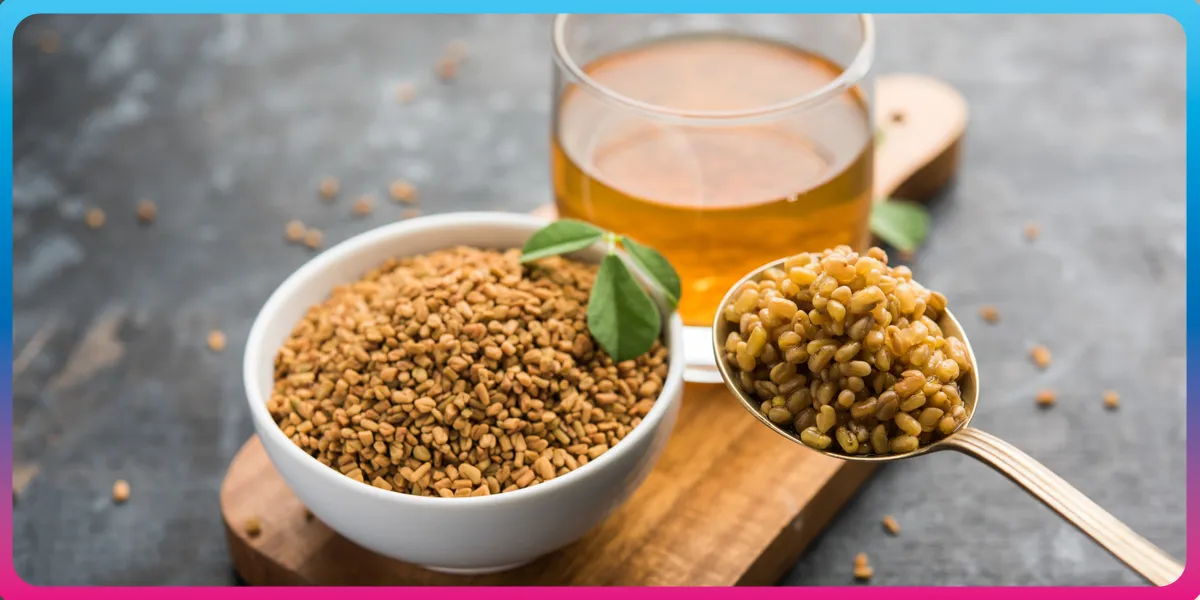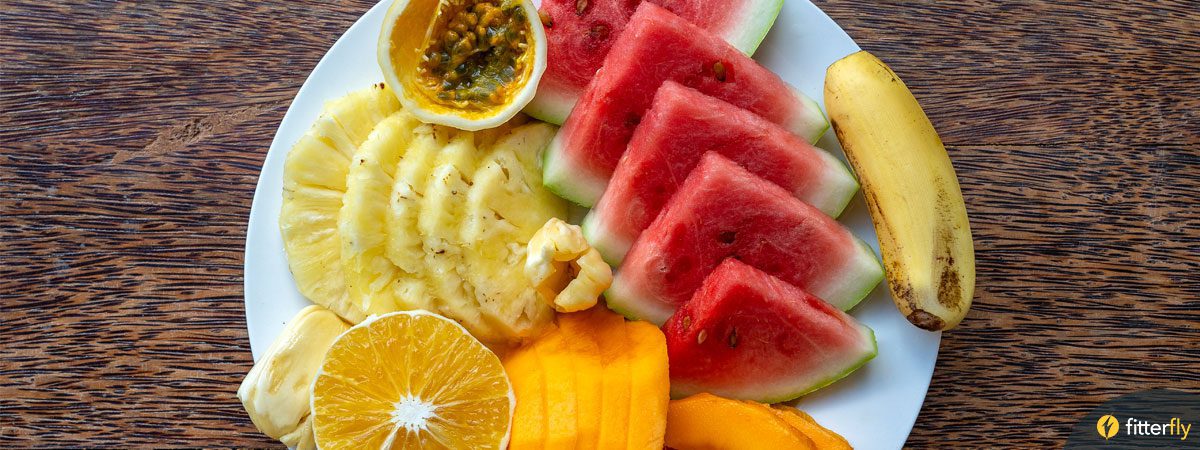How to Use Fenugreek Seeds for Diabetes?

Fenugreek and Diabetes
Come winter and my amma (my paternal grandmother) would set out to make all kinds of laddoos at home – panjiri, dry fruit, besan, gond and what not.
But the most peculiar ones that I found of them all were the literally bittersweet methi ladoos that she would make for herself. Amma had type 2 diabetes and would swear by the antidiabetic power of methi or fenugreek.
Is Methi (Fenugreek) Good for Diabetes?
Methi or fenugreek is an important leafy green, herb and spice used in Indian cooking. However, the most potent form of its consumption is said to be in the form of methi dana or fenugreek seeds.
Trigonella foenum graecum or fenugreek seeds are loaded with soluble fibre which is fundamental in lowering blood sugar level by the virtue of controlled breaking down of food and absorption of carbohydrates. People with diabetes may benefit from fenugreek seeds.
Nutritional Profile of Fenufreek Seeds
To understand the health benefits of fenugreek seeds, we must know about the nutrients present in fenugreek seeds [According to IFCT 2017]:
| Nutrient | Nutritional Value of Fenugreek seeds (per 100 g) |
| Energy | 234.9 kcal |
| Carbohydrate | 10.6 g |
| Protein | 25.4 g |
| Total Fat | 5.7 g |
| Calcium | 135 mg |
| Phosphorus (P) | 435 mg |
| Iron | 8.5 mg |
| Total Fiber | 47.6 g |
Now, let’s explore if fenugreek seeds reduce your blood sugar.
Does Fenugreek Reduce Blood Sugar?
According to a 2017 controlled study, adding fenugreek seeds to one’s diet can synergistically reduce fasting blood glucose and HbA1c levels.
According to a study published in the Journal of Diabetes and Metabolic Disorders, 5 grams of fenugreek powder twice a day before meals for three months resulted in a considerable decrease in fasting blood glucose and postprandial (PP) blood sugar levels for people with diabetes.
It also showed a significant decline in the patients’ LDL or bad cholesterol levels.
Let’s look at the video below, which covers the seven wonders of your spice box, which are also rich in nutrients and antioxidants that can help control your diabetes and provide numerous other health benefits.
To know your chances of Diabetes reversal, take the Diabetes Reversal TestDiabetes Reversal
Calculator
Glycemic Index of Fenugreek Seeds
Because of their hypoglycemic properties, Fenugreek seeds work well towards lowering the glycemic index of rice- and wheat-based heavy diets as they are traditional to our country.
According to the Comparative Study of Fenugreek Seeds on Glycemic Index, the addition of fenugreek seeds to rice/wheat-based diet 15 minutes before the meal caused a significant reduction in glycemic index.
It was beneficial to them when it came to the long-term control of their blood glucose levels and to the prevention of complications due to hyperglycemia.
What Are the Benefits of Fenugreek(Methi) Seeds for Diabetes?
Apart from their antidiabetic properties, fenugreek seeds also have a plethora of other health benefits.
- They are a rich source of vitamins, minerals, and antioxidants, which help protect the cells from the damage caused by free radicals.
- They help stimulate breast milk production during pregnancy and childbirth.
- They are used as an herbal remedy for colds and sore throats due to their antiviral properties.
- They help do away with water retention and bloating, as well as aid in weight loss.
The Best Way to Consume Fenugreek Seeds
1. Soaked
The most prevalent and effective way to include methi dana in your life is by drinking fenugreek tea. 10 grams of methi dana soaked overnight in a glass of hot water and drunk first thing in the morning on an empty stomach can work wonders for people with diabetes.
You can also chew on them if you feel heroic and don’t mind the bitterness😄.
2. Sprouted
Sprouted fenugreek seeds are easier to digest and are significantly less bitter. You can use sprouted seeds in a chat, salads, or simply munch on them as a snack (you can salt, pepper and a dash of lemon juice).
To sprout your methi danas, wash the seeds thoroughly and soak them overnight. Next day, drain them thoroughly, wash and tie them in a muslin cloth.
Repeat the process for 5 days till the seeds sprout with tiny green leaves. Store them in an airtight container to make them last up to a week.
Reduced diabetes medications in 3 months


6.8%
Happy members
EMI
Guarantee
4.8/5
Diabetes Prime Program
3. Dry roasted
Another way of adding fenugreek seeds to your diet is by dry roasting them and then using them in your tadkas for dals and raitas.
Dry roasting them lowers their bitter taste and impart a nutty flavor to them. Dry roasted methi dana can also be added to your daily chapati dough as whole seeds or in powdered format.
Practice caution
Fenugreek seeds have strong hypoglycemic properties.
Hence, it is always a good idea to check with your doctor about the amount of fenugreek seeds to be included in your diet, especially when you are on blood glucose lowering and blood thinning medication.
FitterTake
Fenugreek seeds, known as methi dana, are good for managing diabetes. Packed with fiber, they work by slowing down carbs’ breakdown, helping control blood sugar levels. Studies They can reduce fasting glucose and HbA1c levels.
These seeds also have other benefits, like lowering the glycemic index in diets with rice or wheat, and they’re rich in vitamins and antioxidants. You can enjoy them soaked in hot water overnight, in salads, or roasted for a nutty flavor in meals.
However, caution is needed, especially for those on medication. Fenugreek seeds offer a natural way to help with diabetes, but it’s important to use them wisely with professional guidance.
At Fitterfly, our team of experts is here to guide you on your health journey. If you find managing your diabetes challenging, our team of experts is here to help you.
You can consider enrolling in our Fitterfly Diabetes Prime Program. Start your journey today by giving a missed call to us at 08068507599, and we will reach out to you.
This blog provides general information for educational and informational purposes only and shouldn't be seen as professional advice.
Frequently Asked Questions
Is methi powder good for diabetes?
Methi powder can be beneficial early in diabetes (pre-diabetes or newly detected diabetes) by helping to lower blood sugar levels. Consult with a healthcare professional or a dietician for personalized advice on how to include them in your diet
Is methi dana water good for diabetes?
Methi-dana water can benefit diabetes as it could lower blood sugar levels, but it is more beneficial if you consume soaked methi-dana with water.
How much fenugreek should I take to lower my blood sugar?
The appropriate amount of fenugreek to lower blood sugar can vary for each person. It is recommended to consult with a healthcare professional to determine the right dosage based on personal health conditions.
How to use Irani methi for diabetes?
There is no significant difference between Indian and Irani methi regarding nutritional value. Incorporating Irani methi, or fenugreek, into the diet may support diabetes management. Methods of usage may include adding it to dishes or preparing fenugreek water.
How long does it take for fenugreek to lower blood sugar?
It lowers blood sugar when you are in the pre-diabetes stage. The time it takes for fenugreek to lower blood sugar can vary. If you have diabetes, do not solely rely on fenugreek. Regular monitoring and consultation with a healthcare professional are essential to assess its effectiveness and make any necessary adjustments.
Does methi powder reduce blood sugar?
Methi powder has the potential to reduce mildly elevated blood sugar levels.
Is sprouted/ soaked fenugreek good for diabetes?
Sprouted fenugreek may offer potential benefits for diabetes management due to its nutritional content and ease of digestion.
What is the best way to take fenugreek seeds for diabetes control?
The best way to take fenugreek seeds for diabetes control may vary for individuals. Consulting with a healthcare professional is recommended to determine the most suitable method based on personal health conditions.
Are methi leaves good for diabetes?
Methi leaves may offer potential benefits for diabetes management. Incorporating them into the diet could be beneficial.
Is methi useful in diabetes?
Methi, or fenugreek, is good for diabetes as it potentially aids in blood sugar regulation.
Is methi ladoo good for diabetes?
Methi ladoo contains either jaggery or sugar while making, and therefore it is not good for diabetes.
When is the best time to take fenugreek for diabetes?
The optimal time to take fenugreek for diabetes can vary among individuals. It is advisable to consult with a healthcare professional to determine the most suitable timing based on personal health conditions and lifestyle.
Does methi reduce blood sugar?
Methi, or fenugreek, can potentially reduce blood sugar levels, but individual responses may vary. It is recommended to consult with a healthcare professional to understand how to incorporate methi into the diet for blood sugar control effectively.























Good information